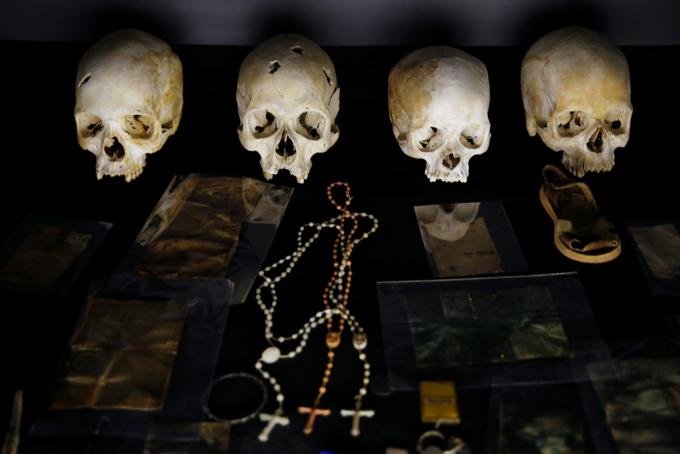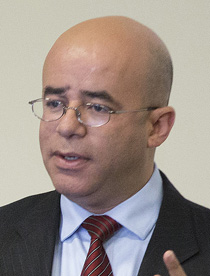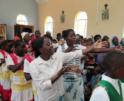
Faith
One hundred fateful days in 1994 changed her life, and that of the Tutsi, Hutu and Twa populations then.

Ospino
"My garden was the pride of neighbors and visitors; people called it the Catholic garden," shared Pascasie Musabyemungu, who works for Catholic Relief Services in Rwanda. She tended to her outdoor garden as an offering to God.
I met Pascasie in July 2019 while visiting Rwanda to learn more about how U.S. Catholics support global solidarity programs.
Pascasie invested countless hours caring for her "Catholic garden." Her almost religious dedication mirrored her devotion to family and community service.
Beautiful and colorful flowers blossomed, almost miraculously, under the scorching African sun. Pascasie trimmed the weeds that grow fast in a land where rain and drought alternate rhythmically throughout the year.
One hundred fateful days in 1994 changed her life, and that of the Tutsi, Hutu and Twa populations then. Nearly one million people died in a fast, brutal and perplexing genocide. Most victims were Tutsi, also some moderate Hutu.
Twenty-five years later, Pascasie remembers those days as if they were yesterday. "How can anyone forget," she said. For 100 days, the water and the sun that sustained Pascasie's garden mixed with blood, wailing and death.
Something inside Pascasie died. She was not the same. Neither were Rwandans. Her garden disappeared. She would not plant flowers again for many years.
Before the genocide, about 70% of Rwandans self-identified as Roman Catholic. Another 20% were Protestant. The genocide was a true theater of horrors where many Christians, mostly Catholic, killed other Christians. "It was beyond anyone's understanding," asserted Pascasie.
More painful for her and other Rwandans was observing the hesitation of far too many Catholic leaders and churchgoing faithful to denounce the violence. Some even encouraged it.
In 2016, the bishops of Rwanda asked for forgiveness for the role that many Catholics played in the genocide. Pope Francis did likewise in 2017 asking "God's forgiveness for the sins and failings of the church and its members" in Rwanda. Silence was an abysmal failing.
For 25 years, Rwandan Catholics have been discerning the consequences of the genocide and their responses to it, institutionally, communally and personally.
Disappointment and resentment are surely part of that process. It is not accidental that barely half of Rwandans today self-identify as Catholic. Nonetheless, a spirit of resurrection has prevailed during the last quarter of a century.
"Rwanda is rising from the ashes of 1994. ... We will do anything to prevent this from happening again," said Pascasie.
As I visited various communities throughout the country, I confirmed her observation. A communal consciousness of being a new people defines almost every aspect of the Rwandan society.
The spirit of communal resurrection has also engendered fresher ways of being church. Pope Francis has summoned Catholics to be "a church that is poor and for the poor." I witnessed that in Rwanda.
The church there, led by its pastors, is visibly committed to solidarity with the poor, social reconstruction and reconciliation among Rwandans living together amidst differences.
Fifteen years after the genocide, Pascasie finally managed to return to her garden. Beautiful flowers continue to blossom today with bright colors in what her neighbors called her "Catholic garden."
Pascasie's garden is the perfect metaphor for the Rwandan society and the church in this country. Listening to her story, I feel that I am part of it along with countless Catholics in the U.S. who support her work through CRS.
Every time U.S. Catholics contribute to the work of solidarity in Rwanda and in the more than 100 other countries where CRS and similar Catholic organizations are present, like Pascasie we make possible that a thousand flowers bloom in God's global community garden.
- Hosffman Ospino is assistant professor of theology and religious education at Boston College's School of Theology and Ministry.
Recent articles in the Faith & Family section
-
Wounds, not scarsJaymie Stuart Wolfe
-
A special collection in the liturgy libraryFather Robert M. O'Grady
-
Witness to a Transfiguration in KenyaMichele Miers
-
Understanding the ScripturesScott Hahn
-
'Cabrini' does extraordinary job of bringing saint to lifeBishop Nicholas DiMarzio


















